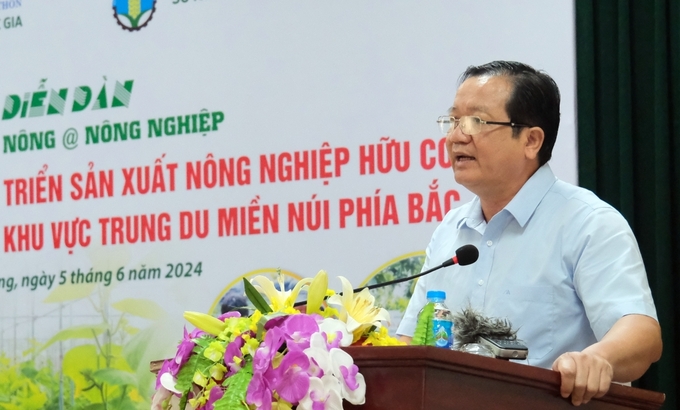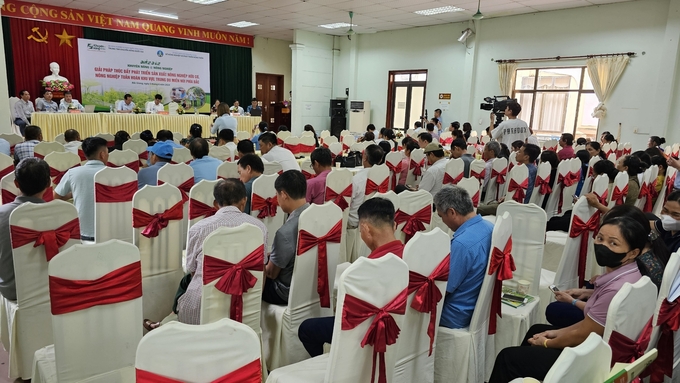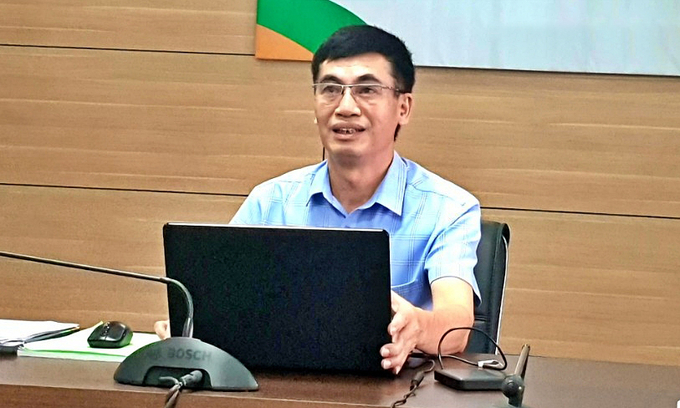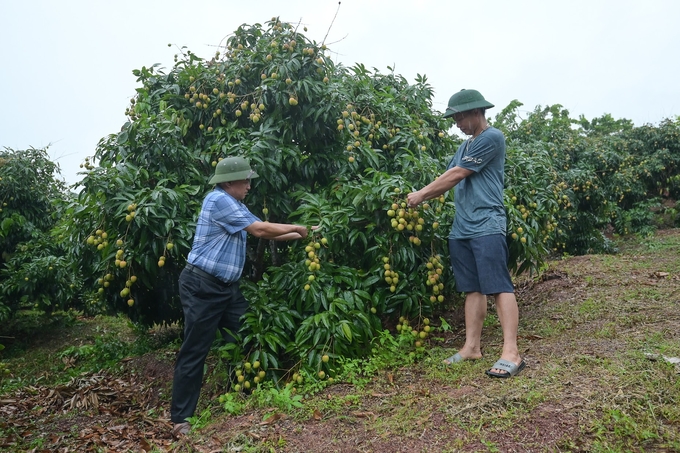May 17, 2025 | 07:04 GMT +7
May 17, 2025 | 07:04 GMT +7
Hotline: 0913.378.918
May 17, 2025 | 07:04 GMT +7
Hotline: 0913.378.918
The Agricultural Extension @ Agriculture forum, with the theme "Solutions to Promote the Development of Organic Agriculture and Circular Agriculture in the Northern Midlands and Mountainous Regions," was organized on June 5 by the National Agricultural Extension Center in collaboration with the Bac Giang Department of Agriculture and Rural Development.

Mr. Le Ba Thanh, Deputy Director of Bac Giang Department of Agriculture and Rural Development, spoke at the opening of the forum. Photo: Bao Thang.
"Organic production should prioritize a long-term perspective, with a preference for longer durations." Indeed, certain communities experience a sense of demotivation as the sale of organic products fails to generate commensurate revenue or profits. They will probably return to traditional production methods," emphasized Mr. Hoang Van Hong, Deputy Director of the National Agricultural Extension Center, while discussing the situation at the meeting.
Mr. Hong discovered that while surveying some planting areas in the region, several households needed to be more open to categorizing their products as organic. Instead, they merely stated that their products were oriented towards organic practices or adhered to organic norms. He highlighted that the sector's directive documents exclusively reference organic products, without including "orientation" terms. Consequently, he urged agricultural extension officers at every level to offer precise and comprehensive instructions for individuals to comply with legislation regarding organic cultivation properly.
One of the concerns raised by Mr. Hong is the duration of the transition time for organic agriculture. More precisely, the period of transition for organic rice is a minimum of 12 months, starting from the commencement of organic production. Furthermore, items that are produced during the transition period are not classified as organic. By assessing the historical land usage and analyzing the presence of pollutants (such as heavy metal residues, chemical fertilizers, and pesticides) in the soil, water, and rice products, it is possible to determine whether the transition time should be extended, shortened, or eliminated.
In addition to the transition period, Mr. Hong also emphasized other concerns, including the avoidance of using shared inputs with traditional production throughout the 12-month transition. "Farmers must diligently cleanse the plow before bringing it to the organic field," he figuratively declared, emphasizing the necessity for strict adherence to the organic production process.

The forum attracted hundreds of farmers to attend directly. Photo: Bao Thang.
Organic products inherently incur greater production costs and thus command higher selling prices due to the rigorous processes involved. Unless there is a substantial improvement in the quality, packaging, labeling, and other aspects, farmers will face difficulties in addressing the output problem.
For immediate results, Mr. Hong recommended that farmers concentrate on reducing production expenses by establishing cooperatives or associations to buy agricultural supplies and inputs in large quantities. In addition, farmers should actively pursue renowned firms, particularly those that are well-established, in order to guarantee the use of high-quality inputs. It is important to avoid adopting an attitude of settling for subpar options, as this could undermine the long-term efforts put into farming.
Mr. Dao Thanh Van, Vice President of the Vietnam Organic Agriculture Association, concurred with Mr. Hong's perspective, acknowledging that customers still harbor reservations regarding organic products. There is still confusion among some people when it comes to differentiating between organic and clean items.
Taking Bac Giang lychee as an example, when it is produced according to organic standards and with geographical indicators, its price in the Japanese market might exceed 80,000 VND per fruit. Mr. Van advised that farmers should carefully evaluate market variables and refrain from engaging in family-scale farming prior to embarking on organic production.
During the forum, Mr. Le Ba Thanh, Deputy Director of the Bac Giang Department of Agriculture and Rural Development, announced that Bac Giang has given its approval for a project aimed at establishing an organic agricultural production model for the period of 2020 to 2025. In addition, they have created a computerized map that identifies the specific locations where the province's main agricultural goods are produced in high quantities and with specialized techniques.
Specifically, in 2023, Bac Giang implemented a comprehensive set of regulations aimed at fostering the growth of organic agriculture and circular agriculture. These policies encompass strategies for integrating production with product consumption, providing assistance to agriculture, forestry, and fisheries, promoting seed support, and fostering the growth of OCOP (One Commune One Product) products.

Mr. Hoang Van Hong: 'Organic production must strictly follow the process.' Photo: Thanh Thuy.
Several circular agriculture models have been established in Bac Giang, including the integration of pig and duck farming with earthworm farming, the combination of pig, duck, and chicken farming with organic fertilizer production, the implementation of rice-fish models, the adoption of rice-mushroom-organic fertilizer production models, the promotion of environmentally friendly rice cultivation models, and the cultivation of organic pomelo in conjunction with eco-tourism and experience tourism.
According to empirical assessments, the implementation of organic agricultural production pilot models can result in a significant economic value increase of up to 300%. Additionally, circular agriculture models contribute to a reduction in the utilization of input materials by 10 - 30% when compared to conventional techniques.
Bac Giang's agriculture saw stable development in 2024, thanks to the significant transition towards organic farming. The winter-spring rice output achieved a level of 60.5 quintals per hectare, representing an increase of 0.6 quintals per hectare compared to the corresponding period in the previous year. Approximately half of the entire agricultural area was dedicated to the production of premium-grade rice. Despite a drop in lychee production, the quality of the fruit was deemed the highest ever, resulting in a significant increase in selling prices, ranging from 100 to 200% higher than the previous year. The agricultural field achieved a production value of 138 million VND per hectare annually.

Many organic agricultural production models in Bac Giang province have high economic efficiency, typically with lychees in Tan Yen and Luc Ngan. Photo: Thanh Thuy.
Nevertheless, organic agriculture production in Bac Giang continues to encounter obstacles. The market for organic products has minimal divergence from conventional items, particularly in regards to selling prices, owing to the limited scope of the operations, which poses challenges in competing with major retail establishments. The range of input materials for organic production is now limited, with limited participation from firms and individuals that do not match the potential. Furthermore, the procedures and policies in place to stimulate organic production are not yet sufficiently robust to serve as effective motivational forces.
However, the administration of the Bac Giang Department of Agriculture and Rural Development recognizes that organic and circular agriculture, which focuses on environmentally friendly farming practices, is a permanent and unavoidable trend. Vietnam views this as a viable approach to agricultural development that aligns with its commitment to reaching net-zero emissions by 2050.
Translated by Linh Linh
![Multi-channel, multi-directional Vietnamese agricultural markets: [7] Deep processing makes global reach easy](https://t.ex-cdn.com/nongnghiepmoitruong.vn/608w/files/huytd/2025/05/16/2946-che-bien-sau-chia-khoa-vang-nang-tam-nong-san-viet-tren-ban-do-the-gioi-080603_110-093858.jpg)
(VAN) The application of deep processing technology is helping Vietnamese agricultural products enhance their value, create competitive advantages, and open doors to conquer global consumers.
![Multi-channel, multi-directional Vietnamese agricultural markets: [6] Agri products go online](https://t.ex-cdn.com/nongnghiepmoitruong.vn/608w/files/content/2024/12/10/1-113313_954.jpg)
(VAN) Bringing agri products onto e-commerce platforms is an effective way to build a brand that many businesses, cooperatives, and agricultural production households are doing.

(VAN) Veterinary training should focus on quality, not just quantity. Veterinarians also need more options to pursue specialized training.

(VAN) The veterinary industry needs to be viewed objectively and further invested in to properly demonstrate its role and importance in the new context.

(VAN) The number of veterinarians graduating each year is not enough to meet actual needs, hence a difficult problem for the growing livestock industry.

(VAN) The strategic partnership between Cambodia, the Philippines, Vietnam, and CGIAR ensures that innovative solutions effectively address national priorities for food system development.

(VAN) This was affirmed by the UK Minister of State at the Department for Environment, Food and Rural Affairs during a working session with Deputy Minister Tran Thanh Nam on May 13.